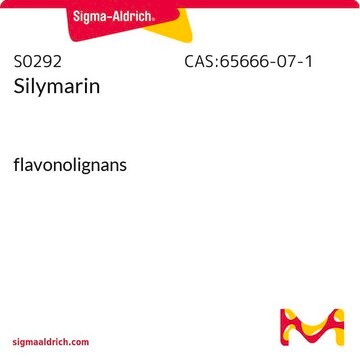C7744
Combretastatin A4
≥98% (HPLC), powder
Synonym(s):
1-(3,4,5-Trimethoxyphenyl)-2-(3′-hydroxy-4′-methoxyphenyl) ethane 3,4,5-trimethoxy-3′-hydroxy-4′-methoxystilbene, 2-Methoxy-5-[(1Z)-2-(3,4,5-trimethoxyphenyl)ethenyl]phenol, CA4
About This Item
Recommended Products
Assay
≥98% (HPLC)
form
powder
color
off-white
solubility
DMSO: >10 mg/mL
storage temp.
−20°C
SMILES string
COc1ccc(\C=C/c2cc(OC)c(OC)c(OC)c2)cc1O
InChI
1S/C18H20O5/c1-20-15-8-7-12(9-14(15)19)5-6-13-10-16(21-2)18(23-4)17(11-13)22-3/h5-11,19H,1-4H3/b6-5-
InChI key
HVXBOLULGPECHP-WAYWQWQTSA-N
General description
Application
- as an anti-tubulin agent to determine the effects of isocitrate dehydrogenases (IDH1 and IDH2) proteins in G2/M phase
- to evaluate the anti-proliferative and pro-apoptotic properties of biphenyl CA4 derivatives in both 2D and 3D cancerous and non-cancerous cell models
- as a microtubule inhibitor to study its effects on motility of Ascaris suum L3 larvae
Biochem/physiol Actions
Signal Word
Danger
Hazard Statements
Precautionary Statements
Hazard Classifications
Acute Tox. 3 Dermal - Acute Tox. 3 Inhalation - Acute Tox. 3 Oral - Eye Dam. 1
Storage Class Code
6.1C - Combustible acute toxic Cat.3 / toxic compounds or compounds which causing chronic effects
WGK
WGK 2
Flash Point(F)
Not applicable
Flash Point(C)
Not applicable
Personal Protective Equipment
Certificates of Analysis (COA)
Search for Certificates of Analysis (COA) by entering the products Lot/Batch Number. Lot and Batch Numbers can be found on a product’s label following the words ‘Lot’ or ‘Batch’.
Already Own This Product?
Find documentation for the products that you have recently purchased in the Document Library.
Customers Also Viewed
Our team of scientists has experience in all areas of research including Life Science, Material Science, Chemical Synthesis, Chromatography, Analytical and many others.
Contact Technical Service











